News
Why does Ramadan start at different times in different places?
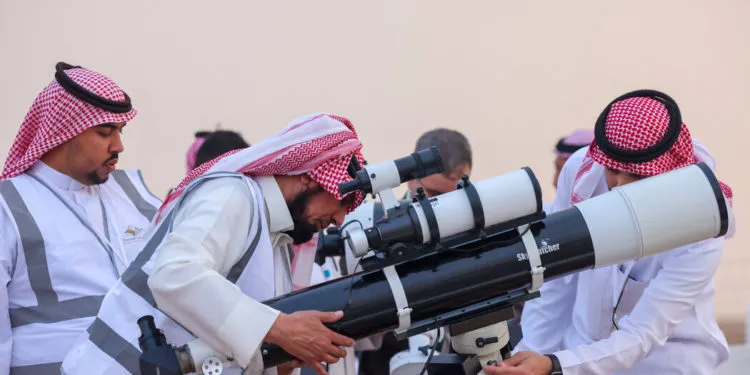
Ramadan, the holiest month of the Muslim calendar, starts on Monday in some countries but on Tuesday in others. How is that possible?
The exact timings depend on when local Islamic authorities around the world declare the sighting of the new moon, the astronomical event that marks the start of the observance.
Here’s why there’s so much variation from place to place.
The basics
Islamic countries, and Muslims around the world, use the traditional Hijri calendar to mark religious events. Each month of that calendar begins with the sighting of the early crescent moon, and the holy month of Ramadan begins at the start of the ninth month.
These customs go back centuries. But the exact start time of Ramadan varies from place to place because it depends on a range of factors, including who observes the moon and how, and whether the sky is clear or cloudy at the time.
That explains why Saudi Arabia declared that Ramadan would start on Monday after reporting a sighting of the crescent moon on Sunday, but also why neighboring Oman reported the same day that the moon was not yet visible. As a result, the two countries will begin their Ramadan celebrations about 24 hours apart. The authorities in Iran, like Oman, have also declared Tuesday to be the official start of the holy month.
In Southeast Asia, Islamic authorities in several countries said over the weekend that they, too, would observe Ramadan from Tuesday, not Monday, after unsuccessful moon sightings. That gave millions of people across the region, including in Indonesia, the nation with the world’s largest Muslim population, an extra day to prepare.
‘A challenging mission’
Astronomers have argued for centuries about what constitutes a crescent moon sighting, according to a recent study in the journal Scientific Reports, which explored how artificial intelligence and machine learning could help predict the moon’s visibility.
New technologies make moon readings more accurate, but they can also make the process more complex, the study said. For instance, does it count as an official sighting if a new crescent moon can be seen by an optical aid but not by the naked eye?
“Deciding on the start of Ramadan has always been a challenging mission, and, as a result, not all Muslims start Ramadan synchronously,” the study’s authors wrote.
In Islamic countries, national guidance helps ensure that Muslims are on the same Ramadan timetable. In other places, the timing can depend on which religious guidance residents follow. This year, for example, the Fiqh Council of North America chose Monday, while the Council of Shia Muslim Scholars of North America chose Tuesday.
Other variables
It isn’t just the start date of Ramadan that varies from place to place. The exact amount of time that people hold their dawn-to-dusk fasts depends on which year it is, and where they live in relation to the Equator.
Because the Hijri calendar is about 11 days shorter than the 365-day-ish Gregorian calendar, the month of Ramadan moves around every year in Gregorian terms. That means the fasting day in the Northern Hemisphere will get shorter between now and 2031, when Ramadan coincides with the winter solstice, Al Jazeera reported. In the Southern Hemisphere, it will grow incrementally longer over the same period.
As for location, latitude matters because it determines the timing of local sunrise and sunset. Muslims who live close to the Equator, where the length of a day changes less from season to season, can expect a relatively consistent fasting schedule each year. For those living at extreme northern or southern latitudes, there is a lot more variation.
That helps explain why, in some parts of Scandinavia, Muslims observe Ramadan fasts based on the time in Mecca, thousands of miles away. If they didn’t, depending on when the holiday fell in a given year, they would either be fasting for most of the day, or barely at all.
News
Gov Zulum accuses security personnel of promoting criminality, bans dale of alcohol
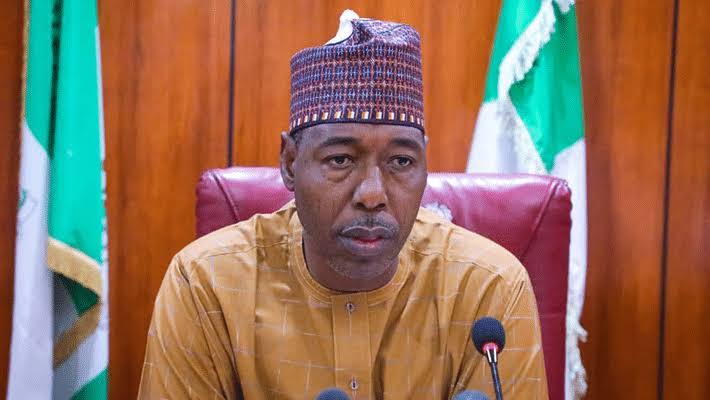
Borno State Governor, Professor Babagana Zulum, has banned the sale of alcoholic beverages while accusing military and other security personnel of promoting criminality and antisocial vices in Maiduguri and its environs.
The Governor said that ex and current serving personnel of the Nigerian security forces have played a significant role in influencing the civilian populace into criminality, radicalism, prostitution and other vices, heightening terrorism threats in the state.
The governor said this on Tuesday at the inauguration of a reconstituted committee on “revocation of illegal hotels, brothels, shanties, and criminal hideouts and curbing the menace of antisocial vices” at the council chambers of the government house in Maiduguri.
“I am happy to know that army officers are here, especially the military, police, and others are here because most of these activities were committed by whom? Some of them are dismissed army officers, dismissed security officers, current army officers, men and officers, including civilians.
“So, there should be no sacred cow in this matter if we want the Maiduguri metropolis and indeed the state to get rid of insurgency, terrorism and other sorts of criminalities,” Zulum said.
In the brief event, the Zulum reconstituted and re-empowered the committee to purge the state of all forms of criminality and antisocial vices in the Maiduguri metropolis and surrounding environments.
The ban on sales and consumption of liquor and alcoholic contents, according to the governor, stems from the rising cases of clashes among rival groups, cultism, prostitution, drug abuse, thuggery and theft, which have led to loss of lives and valuables.
The governor co-opted the military, police, civil defence, and several other security agencies, including the civilian JTF, to join the committee for a holistic approach.
Acknowledging the task before the reconstituted committee, the co-chair decried the deteriorating internal security in Maiduguri and outlined the committee’s immediate line of action.
With the liquor embargo and the demolition of hotels and infrastructures identified as harbouring criminal activities, it is yet to be seen if this decision will affect internal revenue in the state amidst the controversies surrounding the tax reform bill before the national assembly, which the Borno State Governor and notable leaders from the state have championed.
News
FG starts massive overhaul of NYSC scheme, plans teachers’, medical corps
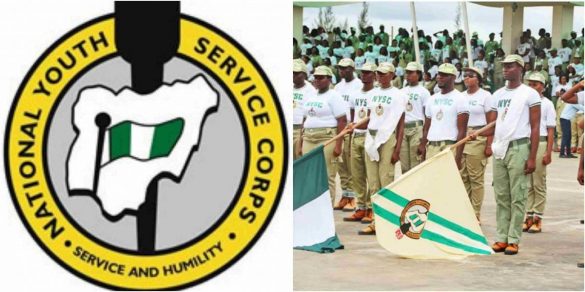
The Federal Government has set up a committee to carry out major changes to the National Youth Service Corps.
This decision followed rising concerns about the safety of corps members, poor facilities, and whether the NYSC still fits into today’s social and economic realities.
The inauguration of the committee happened in Abuja on Tuesday, with key people from government, civil society, and private businesses in attendance.
Speaking at the event, the Minister of Youth Development, Ayodele Olawande, said the NYSC has played an important role in building national unity and helping young people since 1973.
He said, “The issues of corps members’ safety, infrastructural challenges, and the broader question of the scheme’s relevance in an increasingly dynamic socio-economic environment are among the key concerns. However, these challenges also present opportunities that require urgent, visionary, and determined action.”
Olawande said the committee will look into how NYSC works and suggest ways to make it safer, more creative, and more impactful.
“The outcome of this review must align with broader national development objectives, positioning the NYSC as a strategic tool for youth empowerment and nation-building,” he added.
The committee will review current NYSC policies, talk to people across the country and suggest changes to laws, policies, and how the scheme is run.
It will also come up with better ways to fund, track and improve the NYSC.
The final report will be submitted to the minister within a set time.
Also at the event, the Minister of Education, Maruf Tunji Alausa, said the government planned to start a Teachers’ Corps and a Medical Corps.
These will be for NCE graduates and healthcare workers ready to serve in rural areas.
Alausa explained, “The Teachers’ Corps would help bridge educational gaps and create a pathway to government employment, while the Medical Corps would strengthen healthcare delivery in underserved areas, addressing critical issues such as maternal and child health.”
The Special Adviser to the President on Policy and Coordination, Hadiza Usman, stressed the need to improve technical and vocational skills training.
“Such alignment would empower young people to make meaningful, long-term contributions to their communities and to the nation as a whole,” Usman said.
News
Real cause of Herbert Wigwe’s helicopter crash revealed

The United States National Transportation Safety Board (NTSB) has concluded its investigation into the helicopter crash that tragically killed former Access Holdings Plc CEO, Herbert Wigwe, and his family last year.
The crash, which occurred on February 9, 2024, in California near the Nevada border, claimed the lives of Wigwe, his wife Doreen, their son Chizi, and the former group chairman of Nigerian Exchange Group Plc (NGX Group), Abimbola Ogunbanjo.
In the final report, the NTSB stated that the probable cause of the crash was the pilot’s decision to continue the flight under visual flight rules (VFR) into instrument meteorological conditions (IMC).
The NTSB explained that the pilot likely experienced spatial disorientation while manoeuvring the helicopter in poor visibility conditions, leading to the loss of control and a fatal collision with terrain.
The investigation further revealed that the helicopter company’s inadequate oversight of its safety management processes contributed to the incident.
The NTSB found that the helicopter company failed to ensure that its pilots accurately completed and updated flight risk analyses, logged maintenance discrepancies, and adhered to Part 135 regulations before departure. These failures were critical in the chain of events that led to the crash.
The report also indicated that during the return flight, the pilot had communicated with the director of maintenance (DOM) via text message about an issue with the radar altimeter, further highlighting lapses in safety protocols.
The report reads, “The National Transportation Safety Board (NTSB) determines the probable cause of this accident to be: The pilot’s decision to continue the visual flight rules flight into instrument meteorological conditions, which resulted in the pilot’s spatial disorientation and loss of control.
“Contributing to the accident was the company’s inadequate oversight of its safety management processes, including ensuring the pilots were accurately completing and updating the flight risk analysis, logging maintenance discrepancies, and ensuring the helicopter met Part 135 regulations before departure.
“During the return flight, the pilot texted the director of maintenance (DOM) about the issue. After arriving at the company’s flight operations base, the pilot discussed the issue with the company flight follower (who was also the company’s president).
“A company mechanic performed some troubleshooting on the radar altimeter; however, he was unable to rectify the issue, and the radar altimeter remained non-functional.
“The mechanic reported that the pilot and the DOM were aware that the radar altimeter was not functioning, yet they departed at 1822 on the positioning flight to pick up the passengers.
“About 40 minutes later, the positioning flight landed at the airport to pick up the charter passengers. After arrival, the pilot and flight follower had a phone conversation and exchanged text messages, but they did not discuss the status of the radar altimeter or weather conditions
-
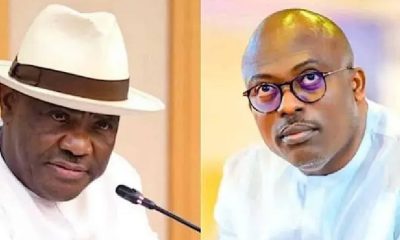
 Opinion23 hours ago
Opinion23 hours agoRIVERS, WIKE, FUBARA, AND THE WAY FORWARD
-

 Politics21 hours ago
Politics21 hours agoJust in: Delta PDP Reps members defect to APC
-

 News24 hours ago
News24 hours agoNANS Barricades Lagos-Ibadan Expressway Over Alleged NELFUND Mismanagement
-
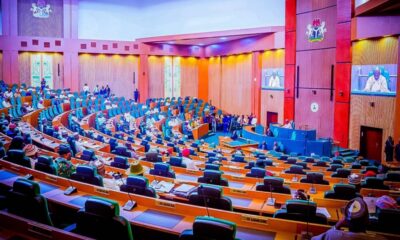
 News20 hours ago
News20 hours agoTension As Lawmakers Warns of Public Revolt Over Insecurity
-

 News24 hours ago
News24 hours agoCourt bans Nnamdi Kanu’s in-law from 3 proceedings over live streaming
-

 News1 hour ago
News1 hour agoReal cause of Herbert Wigwe’s helicopter crash revealed
-

 News19 hours ago
News19 hours agoEdo Speaker, Two Other Lawmakers, Formally Join APC
-
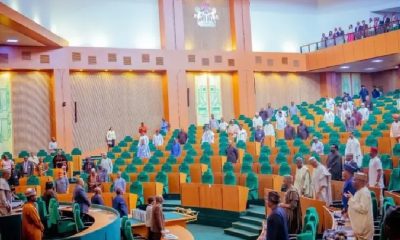
 News19 hours ago
News19 hours agoRep Raises Alarm After Deadly Attacks In Borno, Says Boko Haram Is Returning Stronger





